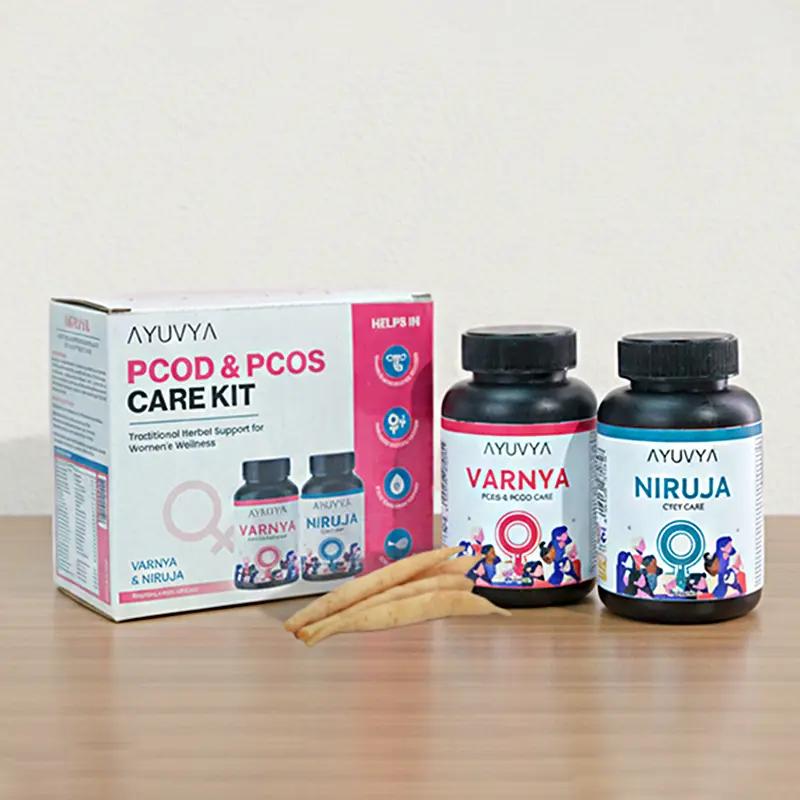5 Proven Shatavari Benefits for Women with PCOS
Jun 13, 2024

Polycystic Ovary Syndrome is a health issue many women face. It causes problems like irregular periods, too much hair growth, and weight issues because of hormone imbalance. To manage and treat PCOS, women often look to different solutions, including natural remedies.
Table of Contents:
- What is Shatavari?
- PCOS Causes in Women
- PCOS Symptoms
- 5 Shatavari Benefits of PCOS
- How Can Shatavari Help with PCOS?
- When to See a Doctor?
- Conclusion
- FAQs
Herbs such as shatavari have shown promise in helping with PCOS. Using shatavari for PCOS and exploring the effects it can offer ways to balance hormones and improve overall reproductive health.
What is Shatavari?
Shatavari is a traditional herb often used in Ayurvedic medicine. Many people use shatavari to help with PCOS, a common hormonal disorder in women. Shatavari and PCOS can be related in terms of treatment of PCOS to balance hormones and improve reproductive health. It is taken as a supplement to help regulate menstrual cycles and reduce symptoms of PCOS.
PCOS Causes in Women
Genetic Factors
PCOS often runs in families, suggesting a strong genetic link. If close family members such as your mother, sister, or aunt have PCOS, your risk of developing the condition may be higher.
Insulin Resistance
Many women with PCOS have insulin resistance, meaning their bodies cannot use insulin effectively. This leads to high insulin levels that can increase the production of androgens (male hormones), which disturb the menstrual cycle and can cause symptoms of PCOS.
Inflammation
Women with PCOS commonly have increased levels of inflammation in their bodies. Chronic inflammation might contribute to higher androgen levels, which can worsen PCOS symptoms.
Hormonal Imbalance
Imbalances in hormones such as androgens are directly linked to PCOS. Women with PCOS tend to produce higher amounts of male hormones, which affect the development and release of eggs during ovulation.
PCOS Symptoms
- Irregular Periods: Many women with PCOS experience irregular menstrual cycles. This can mean periods that come infrequently, too frequently, or not at all. This irregularity is due to the disrupted hormonal balance that prevents regular ovulation.
- Too Much Androgen: High levels of androgens, or male hormones, are a key feature of PCOS. This can lead to unwanted symptoms like excessive facial and body hair (hirsutism), severe acne, and sometimes male-pattern baldness.
- Polycystic Ovaries: Women diagnosed with PCOS often have larger ovaries that house numerous tiny, fluid-filled sacs known as follicles. These follicles surround the eggs but often fail to mature enough to trigger ovulation.
- Weight Gain: Managing weight can be particularly challenging for those with PCOS. This struggle primarily stems from hormonal imbalances, especially insulin resistance, which can lead to obesity or make losing weight harder.
- Fatigue: Fatigue is a common complaint among individuals with PCOS. This symptom is frequently attributed to poor sleep quality, including conditions such as sleep apnea, which is more prevalent in women suffering from PCOS.
- Mood Changes: Women with PCOS often experience significant mood swings, depression, or anxiety. These mood disturbances are believed to be linked to hormonal imbalances, especially fluctuations in estrogen and progesterone that can affect neurotransmitter levels in the brain.
- Difficulty Conceiving: PCOS is a leading cause of infertility due to its impact on ovulation. Many women with PCOS experience infrequent or prolonged menstrual cycles, which indicates irregular ovulation or a lack of ovulation altogether.
5 Shatavari Benefits of PCOS
1. Improved Fertility
Himalaya Shatavari for PCOS improves reproductive health by promoting healthier ovulation cycles. For women with PCOS, irregular ovulation is a major barrier to conception. Shatavari supports the reproductive system by nurturing the womb and ovaries, creating a more favourable environment for ovulation and increasing the likelihood of conception in women facing infertility challenges due to PCOS.
2. Regulation of Menstrual Cycles
Regular use of Himalaya Shatavari for PCOS has been found to help in regulating menstrual cycles. It aids in normalising the cycle duration and reducing pain associated with menstruation. For women with PCOS, who often experience irregular or skipped periods, Shatavari can be particularly beneficial in bringing predictability and reducing discomfort during menstrual cycles.
3. Reduction in Insulin Resistance
Shatavari is noted for its potential to improve insulin sensitivity, addressing a common challenge faced by many women with PCOS. Insulin resistance not only contributes to weight gain and difficulty losing weight but also exacerbates other symptoms of PCOS such as hormonal imbalance. Regular supplementation with Shatavari may help regulate blood sugar levels, thereby aiding in weight management and reducing the risk of developing diabetes, which is a higher risk for those with PCOS.
4. Boosts Energy Levels
The adaptogenic properties of Shatavari make it particularly effective in enhancing energy and combating fatigue, common issues among women with PCOS. Adaptogens help the body cope with stress and improve the efficiency of energy production. By supporting better energy metabolism and reducing stress-related energy depletion, Shatavari can help improve the overall vitality and endurance of women dealing with the exhausting symptoms of PCOS.
5. Mood Stabilisation
PCOS can often lead to fluctuations in mood due to hormonal imbalances and the stress of dealing with chronic symptoms. Shatavari has a soothing effect on the nervous system, which can help stabilise emotions. Its calming properties may alleviate stress, anxiety, and symptoms of depression, providing mental and emotional relief. By enhancing mental well-being, Shatavari can improve the quality of life for those living with PCOS, making daily management of the condition more manageable.
How Can Shatavari Help with PCOS?
To use Shatavari for PCOS, you can easily incorporate it into your daily routine by adding the powder or extract form to your diet. A common method is to mix about half a teaspoon of Shatavari powder into a glass of warm milk or water and drink it twice a day, ideally in the morning and before bedtime.
Additionally, Shatavari capsules are a convenient option; simply follow the dosage instructions on the package, typically one capsule taken once or twice daily. These methods ensure that you consistently receive benefits of shatavari, which may help in balancing hormones and managing PCOS symptoms.
When to See a Doctor?
It is important to see a doctor if you notice persistent symptoms that could indicate a health issue, or if your symptoms worsen over time. If you are experiencing unusual pain, persistent discomfort, significant changes in your bodily functions, or if home remedies and over-the-counter treatments don't seem to help, it is crucial to seek professional medical advice.
Additionally, if you experience sudden, severe symptoms like chest pain, difficulty breathing, or severe bleeding, you should seek immediate medical attention. Regular check-ups can also help catch any potential health issues early, making treatment more effective.
Conclusion
Shatavari offers a natural and effective way for managing symptoms of PCOS. Known for its hormone-balancing and reproductive health benefits, this herb is useful in improving menstrual cycles, boosting fertility and emotional stability in women with PCOS. By incorporating shatavari in PCOS treatment, women can experience better health overall. However, it is important to consult with an Ayurvedic expert, who can guide you on proper intake of shatavari.
Frequently Asked Questions
Yes, Shatavari can be beneficial for ovarian cysts as it helps balance hormones and supports the reproductive system, which might reduce the formation of cysts.
Shatavari is known to help regulate menstrual cycles by promoting hormonal balance, making it useful for women with irregular periods.
Shatavari is considered one of the best Ayurvedic remedies for PCOS because it helps balance hormones and supports fertility and reproductive health.
Shatavari may aid in improving insulin sensitivity, thereby helping manage insulin resistance, a common issue in women with PCOS.
People allergic to asparagus should avoid Shatavari, and it is also not recommended for those with estrogen-sensitive conditions due to its estrogen-like effects.
Taking Shatavari daily can help improve overall reproductive health, support a healthier menstrual cycle, and balance hormones.
PCOD cannot be permanently cured, but its symptoms can be managed effectively through lifestyle changes, medications, and natural remedies like Shatavari.
Managing PCOS permanently involves a combination of regular exercise, a healthy diet, weight management, and sometimes supplements like Shatavari.
Ayurveda recommends lifestyle changes, dietary adjustments, and herbal remedies like Shatavari to help manage and reverse the symptoms of PCOS.
Shatavari does not typically cause weight gain; it is more often used to help balance the body and support overall health.














